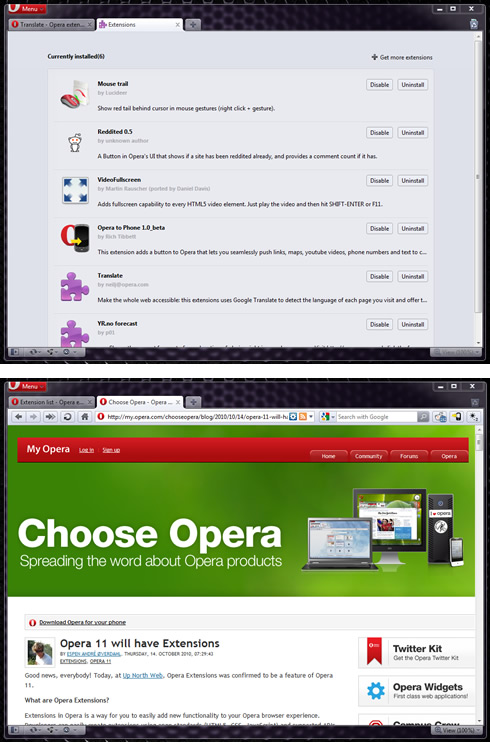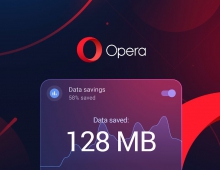
Opera 11 Alpha Released
Opera today released the first alpha of Opera 11, the next version of the company?s desktop web browser.
Opera 11 is the first Opera browser to include extensions, browser add-ons made using Opera application programming interfaces (APIs) and web standards like HTML5 and JavaScript. Opera also now adds a new level of customization. Opera 11 alpha is available from http://www.opera.com/browser/next/.
Extensions allow users to make their web browser their own by adding features and functionality directly into the browser itself, rather than as standalone Opera Widgets or Opera Unite applications. Developers can build extensions with the same web standards they already use to build websites and web applications. Better yet, with only a few tweaks to their code, developers who have already authored a similar extension for other browsers will be able to share their creation with more than 50 million Opera desktop users.
Make an extension in three steps:
1. Visithttp://dev.opera.com/articles/view/introduction-to-opera-extensions/ for complete tutorials and a guide to getting started.
2. Code your extension using common web standards, such as HTML5, JavaScript and CSS.
3. Upload to http://addons.labs.opera.com/.
Opera checks all extensions before they are made public to ensure the catalog of extensions is free from defects and malicious software.
Opera today also launched an open developer API for the Opera Link browser synchronization service. Using this API developers can integrate Opera Link data with other services online and build applications with libraries made available for Java and Python: http://dev.opera.com/articles/view/building-your-first-link-api-application/
Opera 11 alpha is available from http://www.opera.com/browser/next/ for Windows, Mac and Linux computers.

Extensions allow users to make their web browser their own by adding features and functionality directly into the browser itself, rather than as standalone Opera Widgets or Opera Unite applications. Developers can build extensions with the same web standards they already use to build websites and web applications. Better yet, with only a few tweaks to their code, developers who have already authored a similar extension for other browsers will be able to share their creation with more than 50 million Opera desktop users.
Make an extension in three steps:
1. Visit
2. Code your extension using common web standards, such as HTML5, JavaScript and CSS.
3. Upload to http://addons.labs.opera.com/.
Opera checks all extensions before they are made public to ensure the catalog of extensions is free from defects and malicious software.
Opera today also launched an open developer API for the Opera Link browser synchronization service. Using this API developers can integrate Opera Link data with other services online and build applications with libraries made available for Java and Python: http://dev.opera.com/articles/view/building-your-first-link-api-application/
Opera 11 alpha is available from http://www.opera.com/browser/next/ for Windows, Mac and Linux computers.






















